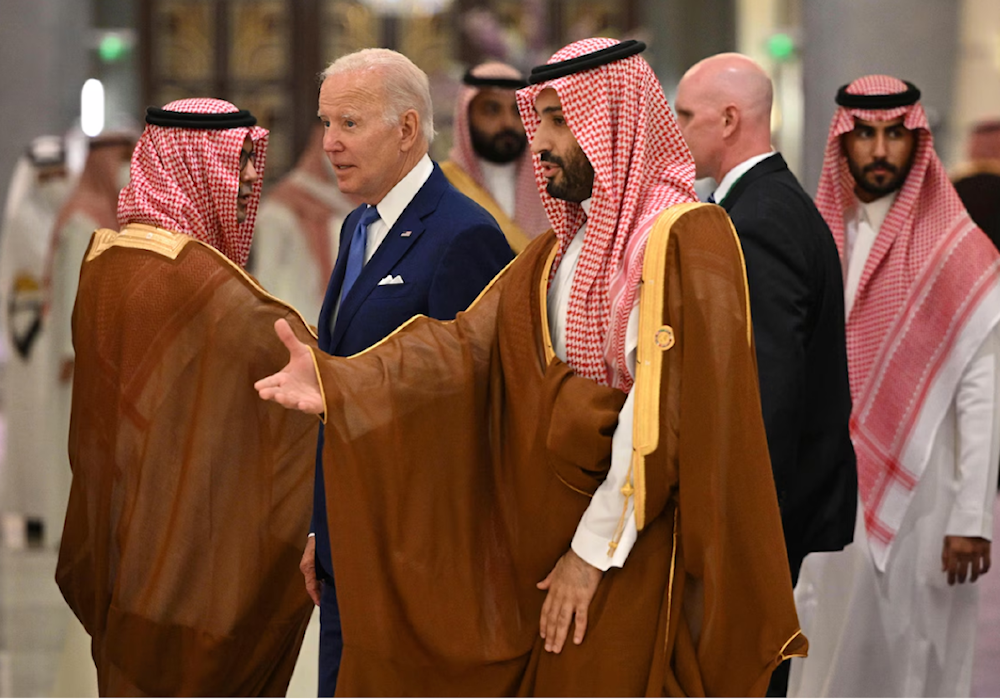Gulf states urge US to stop 'Israel' from attacking Iranian oil sites
Saudi Arabia, the United Arab Emirates, and Qatar are refusing to allow "Israel" to fly over their airspace for any attack on Iran.
-

Saudi Crown Prince Mohammed bin Salman and US President Joe Biden on July 16, 2022 (AP)
Gulf states are urging Washington to prevent "Israel" from bombing Iran's oil assets, fearing the targeting of their oil facilities by the Axis of Resistance, three Gulf sources told Reuters.
Saudi Arabia, the United Arab Emirates, and Qatar are refusing to allow "Israel" to fly over their airspace for any attack on Iran and have informed Washington of this, according to three government sources.
During discussions this week, Iran warned Saudi Arabia that if "Israel" was given any aid in carrying out an assault, the Kingdom's oil infrastructure would be at risk, according to a senior Iranian official and an Iranian diplomat.
Ali Shihabi, a Saudi expert close to the Saudi royal court, divulged that "the Iranians have stated: 'If the Gulf states open up their airspace to Israel, that would be an act of war.'"
According to the diplomat, Tehran has delivered a clear warning to Riyadh that its allies in Iraq and Yemen may retaliate if "Israel" receives regional backing against Iran.
A Gulf source close to government circles told Reuters that the Iranian Foreign Minister's visit to Riyadh and the Saudi-American discussions at the defense ministry level are part of a concerted effort to handle the problem.
A person familiar with the conversations in Washington acknowledged that Gulf officials had communicated with their colleagues in the United States to express worry about the possible breadth of Israeli retaliation.
Jonathan Panikoff, former deputy US national intelligence officer for the Middle East and currently at the Atlantic Council think tank, believes that the "Gulf states' anxiety is likely to be a key talking point with Israeli counterparts in trying to convince Israel to undertake a carefully calibrated response."
OPEC, led by Saudi Arabia, has enough spare oil capacity to cover any losses from Iranian supply delays, but if Saudi Arabia or the UAE's oil infrastructures are also targeted, the world oil supply might be jeopardized.
"The Gulf states aren't letting Israel use their airspace. They won't allow Israeli missiles to pass through, and there's also a hope that they won't strike the oil facilities," according to the Gulf source.
Despite recent Saudi-Iranian reconciliation, the United States military presence in Gulf states is noticeable. Concerns over oil security and regional warfare have affected negotiations between Emirati authorities and the United States, particularly after Yemen's Ansar Allah launched missile assaults on UAE oil facilities.
Gulf sources told Reuters that protecting all oil sites remained a difficulty, thus the key approach remained to signal to Iran that Gulf states represent no danger.
Sanctions in lieu of hitting Iran oil facilities: US offer to 'Israel'
President Joe Biden has cautioned "Israel" not to attack Iran's nuclear installations, and US officials are concerned that an assault on the country's energy infrastructure may destabilize energy markets, Bloomberg reported. However, with the Israeli response against Iran likely at any time, the US has little confidence that the situation would not worsen further.
After Iran's Operation True Promise 2, Biden is desperately attempting to confine any Israeli response to military targets such as air bases and missile installations. To this end, rather than "Israel" targeting oil facilities or other economic targets, the US is offering options such as a new wave of economic sanctions, according to anonymous individuals familiar with the situation.
The US strategy is to provide Israeli Prime Minister Benjamin Netanyahu with an out, allowing him to reject calls from hardliners in his coalition for considerably harsher reprisal. It remains to be seen if he will accept it, especially considering that the Biden administration has so far refused to impose its views by suspending military aid to the occupation.
Vice President Kamala Harris' campaign wants to avoid the controversy from draining support in crucial states, particularly Michigan, which has a sizable Arab and Muslim American community. Netanyahu, who has openly boasted about his strong ties with Republican nominee Donald Trump, has shown little interest in helping her.
According to Ali Vaez, Iran Project Director at the International Crisis Group, "Escalation in the region helps Trump, which is also good for Bibi because it means not just four more weeks of unrestrained behavior, but four years of no American pressure."
On Wednesday, Biden and Netanyahu spoke for the first time in almost a month, with White House Press Secretary Karine Jean-Pierre describing the call as "direct" and "productive". It happened after Israeli Security Minister Yoav Gallant postponed a visit to the United States. An Israeli official, who requested anonymity to discuss the subject, said Netanyahu instructed Gallant not to leave until his cabinet authorized its response to Iran.
Gallant on Wednesday vowed that “our attack on Iran will be deadly, precise and above all surprising. They will not understand what happened and how it happened. They will see the results.”
Gallant misled the public into believing Iran's strike was a failure, something widely debunked in recent reports.

 5 Min Read
5 Min Read








